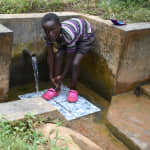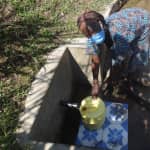Stories from the Field
As we work to provide water, we're committed to helping people like you meet your global neighbors and to realize that we all share the same basic needs. We hope to break down stereotypes and the false distinctions between the so-called winners and losers, rich and poor, the needy and charitable, by introducing you to the people we serve with the respect and admiration they rightfully deserve.
These are stories of hope, told in the words of those who carry out this work every day - our friends in the field.
Ewamakhumbi Community, Mukungu Spring
"Before construction of our spring, we used to fetch dirty water that was contaminated. Whenever we drank the water before treating it, we suffered stomachaches and diarrhea." "Getting water is now very easy and enjoyable. At times, I just go and spend time cleaning the environment around the spring to ensure it's always clean." "Our parents no l...
Eshikhugula Community, Shaban Opuka Spring
"Before the spring was protected, it was difficult to fetch water as community members used any available utensils to fetch the water to fill their jerricans." "Today, there is a big difference. I am able to access clean and safe water. There are no delays nowadays and it is easy to fetch the water from the spring." "The water is plenty and there...
Kalenda A Community, Webo Simali Spring
"Before the project, it was really a hard time to fetch water from this spring." "The surrounding area was bushy, leading to continued siltation by sand and contamination from rotten plant leaves. Waste products were more abundant on the water's surface." "Furthermore, the water surface was a playing ground for the children, increasing the risk o...
Giving Udpate: Bung'onye Community, Shilangu Spring
"In the past, getting water from this spring was very hard." "Accessing it was much harder during the rainy season because the water used to swell everywhere, making the environment so muddy." "Besides that, a lot of siltation was taking place, making the water unsafe for human use." "Also, much time was being wasted in collecting water as only ...
Musiachi Community, Mutuli Spring
"Before it was protected, our parents feared sending us to the spring because we had a pool of water and anything could easily happen." "Now, we can make several trips to the spring without our parents being worried." "As pupils, we are now able to have group discussions after we are done with drawing water, and with this, we know when we...




